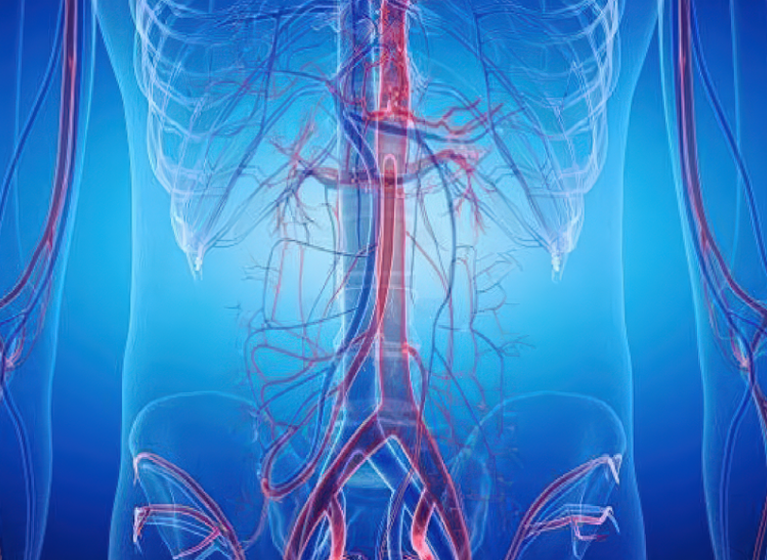
Recovering from open abdominal aortic aneurysm (AAA) surgery is difficult. There's the stay in intensive care, then in a regular hospital room, and then on to weeks of recovery at home. What if that process could be made quicker and easier?
UVA Health has updated the recovery process for our open AAA surgery patients by implementing the Enhanced Recovery After Surgery (ERAS) program. Introduced for open AAA patients in May 2022, this program has led to significant improvements for our heart patients, including faster recovery, fewer complications, and better overall outcomes.
ERAS is a patient-focused approach that uses evidence-based practices to improve every stage of surgery. By encouraging early movement, effective pain management, and collaboration among specialists, the program helps patients recover more quickly with fewer issues.
“Our ultimate goal is to make every step of the surgical journey as safe, effective, and patient-centered as possible,” says Behzad Farivar, MD, a vascular and endovascular surgeon and co-director of UVA Health’s Aortic Center.
Recovery Program Specially Designed for AAA Patients
Our heart and vascular surgery team at UVA Health sought to both improve recovery times and reduce possible complications, like heart attacks, infections, and arrhythmias, after open AAA surgery. They worked together to adapt and implement the ERAS protocol so that is was focused on the specific needs of open AAA patients.
Key features of the program include:
- Team collaboration: Specialists in anesthesia, nutrition, physical therapy, and other areas work together to create a complete care plan.
- Tailored protocols: The team adapted existing ERAS guidelines specifically for open AAA surgery.
- Presurgical assessments: Physical therapists assess patients before surgery to check things like frailty and readiness for recovery.
- Data-driven approach: Baseline metrics were used to guide the program’s development and measure its effectiveness.
“We left no stone unturned,” says Farivar. “Every step was taken to ensure the best possible outcomes for our patients.”
With ERAS, Prepping for Recovery Begins Before Surgery
ERAS works by employing a series of steps that providers and patients follow before, during, and after surgery. The first stage begins before surgery. In this stage, specific instructions guide patients on how to prepare their bodies for the procedure. That means getting as healthy as possible: staying physically active, eating a nutritious diet that supports healing, and quitting smoking (if necessary). These presurgery steps reduce complications and speed up the overall recovery process.
On the day of surgery, patients are given a combination of nonopioid medications to help manage discomfort and reduce the need for narcotics.
After surgery, the recovery plan includes more nonopioid pain management, early mobilization to get patients out of bed and moving quickly, and a guide for eating and drinking safely. And, after patients leave the hospital, the ERAS plan continues at home with specific wound care, exercise, and diet guidelines.
Relying on Best Practices
The ERAS program improves recovery by relying on best practices throughout the process:
- Pain management and fluid administration plans help keep patients comfortable, encourage healing, and protect patients from opioid dependence.
- Early mobility is encouraged to speed up recovery and prevent complications.
- Education for patients and caregivers helps them take an active role in the recovery process.
“Our ERAS program empowers patients to take an active role in their recovery,” Farivar explains. “Early feeding, mobility, and non-opioid pain management promote healing while keeping discomfort in check.”
Improved Results With ERAS
Since the ERAS program began, UVA Health has seen outstanding improvements in patient outcomes. When comparing data from before the program (July 2018 to May 30, 2022) with the results after it started (May 31, 2022 onward), we've seen:
- Length of stay (LOS) dropped from 10.5 days to 8.1 days, improving by 23%.
- Discharges to home increased from 37.5% to 78%.
- Mortality decreased from 2 deaths to zero.
“These results reflect not only the strength of our protocols but also the dedication of our entire team,” says Farivar.
Further Evolving Recovery Processes for Better Outcomes
UVA Health is committed to further improving the ERAS program. The team plans to track additional metrics such as patient pain scores, readmission rates, and patient satisfaction to ensure continued progress. Through this, we hope to further improve our patient recovery and the overall surgery and recovery experience.
UVA Health’s ERAS program underlines our dedication to excellent care tailored to the needs of patients. By combining advanced surgical techniques with personalized recovery plans, we’re helping patients recover more quickly and safely.